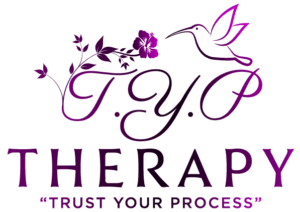
T.Y.P Therapy, LLC is a 100% telehealth provider. All sessions will be conducted virtually through a secure HIPPA-Compliant Platform



Virtual Support Groups (18+)
Teenage Individual Therapy (16 to 17)
Therapeutic Services for Domestic Violence Victims/Survivors (services provided by counselor interns who are professionally trained/in-training) (18+)
Clinical Supervision & Consultation Services (LSW, LAC, CADC)
Young Adult Individual Therapy (18-40)
Specialties
PLEASE CLICK ON A BOX TO LEARN MORE
Trauma & PTSD
Post-traumatic stress disorder (PTSD) is a real disorder that develops when a person has experienced or witnessed a scary, shocking, terrifying, or dangerous event. These stressful or traumatic events usually involve a situation where someone’s life has been threatened or severe injury has occurred. Children and adults with PTSD may feel anxious or stressed even when they are not in present danger.
Depression, Anxiety, & Bipolar Related Disorders
Physical, Sexual, and Emotional Abuse
The word “abuse” is an umbrella term that encompasses different ways one person may intentionally harm another. There are a variety of differences between physical abuse, emotional abuse, and sexual abuse. Gaining a basic understanding of each type of abuse, respectively, can help to illuminate their differences. It is important to note that any form of abuse can be seriously damaging to its victims.
Emotional Abuse
Teen emotional abuse is comprised of non-physical, abusive behaviors that are deliberately used to cause mental or emotional pain. According to Verywell Mind, “Emotional abuse is a way to control another person by using emotions to criticize, embarrass, shame, blame, or otherwise manipulate another person.
Low Level Substance Use/ Recovery
Substance use disorder (SUD) is a mental health condition in which a person has a problematic pattern of substance use that causes distress and/or impairs their life. SUD exists on a spectrum and may be mild, moderate, or severe. It typically involves an overpowering desire to use the substance, increased tolerance to the substance, and/or withdrawal symptoms when you stop taking the substance.
Therapeutic Techniques







Cognitive-Behavioral Therapy (CBT)
CBT places an emphasis on helping individuals learn to be their own therapist’s. Cognitive behavioral therapy is a psycho-social intervention that aims to improve mental health. CBT helps people learn how to identify and change destructive or disturbing thought patterns that have a negative influence on behavior and emotions., improving emotional regulation, and the development of personal coping strategies that target solving current problems.
Motivational Interviewing (MI)
Motivational interviewing is a counseling method that helps people resolve ambivalent feelings and insecurities to find the internal motivation they need to change their behavior. It is designed to strengthen personal motivation for and commitment to a specific goal by eliciting and exploring the person’s own reasons for change.
Humanistic Therapy/Approach
Strength-Based
Strength-based therapy is a type of positive counseling that focuses more on your internal strengths by emphasizing your personal growth and empowerment rather than your weaknesses, failures, and problems. This focus sets up a positive mindset that helps you build on you best qualities, find your strengths, improve resilience and change worldview to one that is more positive.
Solution-Focused Brief Therapy (SFBT)
Solution-Focused Brief Therapy (SFBT) is a type of treatment that highlights a client’s ability to solve problems, rather than why or how the problem was created. It focuses on a person’s present and future circumstances and goals rather than past experiences.,
Person-Centered Therapy/Approach
Person-centered therapy seeks to facilitate a client’s self-actualizing tendencies. It allows clients to take more of a lead in discussions so that they will discover their own solutions. the therapist is nondirective but supportive, allowing the client to direct the course of their therapy.
Behavior Therapy
Behavior therapy is a form of therapy that seeks a person to identify and change potentially self-destructive or unhealthy behaviors. The goal is to reinforce desirable behaviors and eliminate unwanted ones.
